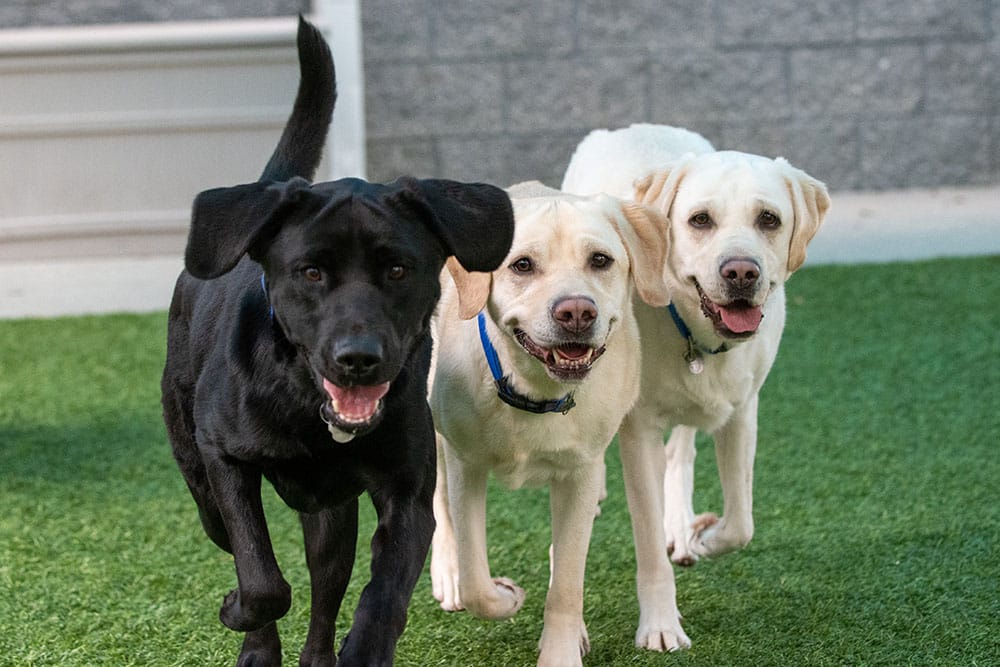Home » Service Dogs » Our Dogs » Released Dog Adoption
Released Dog Adoption
 Canine Companions is committed to finding the perfect placement for every dog, no matter what that placement might be. If a dog is deemed behaviorally or medically inappropriate for our program, we will first evaluate if the dog is suitable for transfer to another agency, such as another service dog organization, drug detection or search and rescue. If agency transfers are not a good fit for the dog, the dog will be released and made available for adoption as a family pet.
Canine Companions is committed to finding the perfect placement for every dog, no matter what that placement might be. If a dog is deemed behaviorally or medically inappropriate for our program, we will first evaluate if the dog is suitable for transfer to another agency, such as another service dog organization, drug detection or search and rescue. If agency transfers are not a good fit for the dog, the dog will be released and made available for adoption as a family pet.
The vast majority of released dogs are adopted by their volunteer puppy raisers, but we do occasionally have dogs available for adoption to other members of our community. Canine Companions respectfully considers applications from close friends and family members of the puppy raiser who are actively involved with the organization but reserves the right to make the final decision on where the dog will ultimately be placed.
- Most Canine Companions released dogs are between one and two years of age, though in rare cases younger puppies or older retired service dogs become available.
- All Canine Companions dogs are Labrador Retrievers, Golden Retrievers or Lab/Golden crosses.
- Dogs may be released from the program for any number of medical and/or behavioral reasons. This may include orthopedic problems, allergies, cataracts, assertiveness, inappropriate vocalizations, anxiety, and more.
- The adoption fee for a released Canine Companions dog is $2000. This fee is waived for the dog’s volunteer puppy raiser.
Because we receive far more inquiries than the number of dogs available, dogs are carefully matched to the adoptive home best suited to their needs. This means that we do not maintain a chronological wait list, but in general applicants should expect to wait several years before being given the opportunity to adopt a released dog. Applicants will be expected to provide an annual update to their application to maintain their candidacy.
If you are interested in receiving an application for the released dog program, please check that you meet the following criteria to apply.
All potential adoptive homes must meet the following:
- Actively engage with Canine Companions on an ongoing basis, generally as a donor or volunteer.
- No more than one Canine Companions released dog or no more than three total dogs already in the home.
- Willing and able to provide all ongoing care and training for the lifetime of the dog, including transportation costs to pick up the dog from a Canine Companions campus.
- Agree not to place or utilize the dog as any type of service dog.
- Any adoption home that decides to not keep the dog must agree to return them to Canine Companions to be placed.
If you meet the above criteria, please contact the staff person at Canine Companions that you work most closely with (development director, volunteer coordinator, puppy program manager, etc.) to request a released dog application.
If you are interested in adopting a released dog but are not yet engaged with Canine Companions, please contact us. Click here for information on becoming a volunteer or here for information on becoming a donor. You can also click here to find the regional center closest to you if you have additional questions. 1
FAQs:
Due to the vast number of inquiries we receive, we respectfully ask that you not check the status of your application. We will reach out to you if a suitable dog becomes available and on an annual basis to update your application.
Each Canine Companions dog receives top-notch training and veterinary care from the moment they are born. The $2000 fee offsets a small portion of these costs and helps us continue placing service dogs free of charge to people with disabilities.
Many Canine Companions released dogs go on to do important therapy dog work in their communities. Click here to learn more about our therapy dog pilot program. Remember that a therapy dog is a pet dog utilized in specific settings for the benefit of others. Therapy dogs are not service dogs or emotional support dogs and do not have public access. Not all released dogs are appropriate for therapy dog work. Our training and veterinary staff determines the appropriateness of the dog for therapy dog work at the time of release. If you are interested in adopting a released dog for therapy dog use, please click here.
All veterinary care, training and other aspects of dog ownership are the responsibility of the adopter. However, should the adopter become unable to continue caring for the dog, Canine Companions will reclaim ownership of the dog and find it another suitable home.
Canine Companions dogs have been bred to be highly attuned to the humans in their family. We have set limits to ensure that each dog receives the individual love and attention they need to thrive in their adoptive homes.
No, all dogs must be picked up on campus, in person, to allow for a meet and greet before taking the dog home.
All Canine Companions dogs spend the first 16 to 18 months of their lives with volunteer puppy raisers, who provide socialization and basic training, including leash manners and crate training. Most dogs begin professional training with Canine Companions instructors before being released, but they can be released at any stage in the program and may benefit from additional training depending on the reasons for release. They are not off-leash trained. Canine Companions does not provide additional training for released dogs.
Prior to adoption, all dogs will be spayed or neutered (if age-appropriate), up to date on vaccines and parasite preventatives, and examined by one of our veterinarians. Those who have progressed to professional training additionally undergo heart, eye, hip, and elbow clearances. Any known medical concerns will be communicated to the adoptive home prior to placement.
Whelping breeder caretakers will be offered the first right of refusal to adopt puppies released prior to placement with a puppy raiser. In this case, the adoption fee will be waived. Breeder caretakers interested in adopting an older puppy or dog from one of their breeder’s litters should submit a general application.
Many released dogs are content just being household pets. Canine Companions dogs are generally food motivated and enjoy learning. Many released dogs, particularly those with higher energy levels, enjoy participating in obedience training, trick training classes, agility, flyball or nose work classes.
